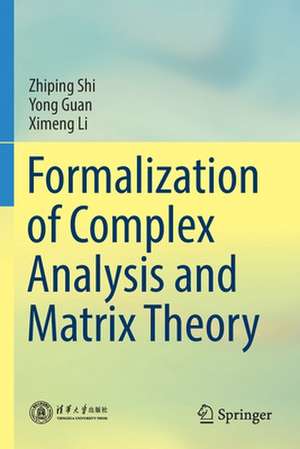Formalization of Complex Analysis and Matrix Theory
Autor Zhiping Shi, Yong Guan, Ximeng Lien Limba Engleză Paperback – 12 aug 2021
As mathematical developments continue to gain in complexity, sometimes demanding proofs of enormous sizes, formalization has proven to be invaluable in terms of obtaining real confidence in their correctness. This book provides a basis for the computer-aided verification of engineering systems constructed using the principles of complex analysis and matrix theory, as well as building blocks for the formalization of more involved mathematicaltheories.
| Toate formatele și edițiile | Preț | Express |
|---|---|---|
| Paperback (1) | 884.56 lei 6-8 săpt. | |
| Springer Nature Singapore – 12 aug 2021 | 884.56 lei 6-8 săpt. | |
| Hardback (1) | 890.54 lei 6-8 săpt. | |
| Springer Nature Singapore – 11 aug 2020 | 890.54 lei 6-8 săpt. |
Preț: 884.56 lei
Preț vechi: 1078.74 lei
-18% Nou
Puncte Express: 1327
Preț estimativ în valută:
169.26€ • 184.43$ • 142.63£
169.26€ • 184.43$ • 142.63£
Carte tipărită la comandă
Livrare economică 23 aprilie-07 mai
Preluare comenzi: 021 569.72.76
Specificații
ISBN-13: 9789811572630
ISBN-10: 9811572631
Ilustrații: X, 168 p. 357 illus.
Dimensiuni: 155 x 235 mm
Greutate: 0.26 kg
Ediția:1st ed. 2020
Editura: Springer Nature Singapore
Colecția Springer
Locul publicării:Singapore, Singapore
ISBN-10: 9811572631
Ilustrații: X, 168 p. 357 illus.
Dimensiuni: 155 x 235 mm
Greutate: 0.26 kg
Ediția:1st ed. 2020
Editura: Springer Nature Singapore
Colecția Springer
Locul publicării:Singapore, Singapore
Cuprins
Introduction.- Algebraic Systems.- Complex Numbers.- Gauge Integration.- FourierTransformation.- Discrete Fourier Transformation.- Matrices.
Notă biografică
Zhiping Shi is a Full Professor at the College of Information Engineering, Capital Normal University. Holding a Ph.D. from the Institute of Computing Technology, Chinese Academy of Sciences, his research interests include the formalization of mathematical theories, formal verification of IT systems, computer vision, and artificial intelligence. He has (co)authored over 100 peer-reviewed research papers and has led numerous research projects at national and international level.
Yong Guan is a Full Professor at the College of Information Engineering, Capital Normal University. His main research interests include formal verification, reliable embedded systems, and robotics. He has (co)authored over 180 research papers and has successfully conducted over 10 research projects at national and international level. He is a recipient of the “Special Government Allowance” issued by the state council and is the Head of the International Science and Technology Cooperation Base of Electronic System Reliability and Mathematical Interdisciplinary Research – a research center approved by the Ministry of Science and Technology of the People’s Republic of China. Ximeng Li is a Lecturer at the College of Information Engineering, Capital Normal University. He holds a Ph.D. from the Technical University of Denmark (DTU) and was a Postdoctoral Researcher at DTU and TU Darmstadt, Germany. His research is mainly focused on the formal verification of software systems. He has published in highly respected computer science conference proceedings and journals such as ESORICS, Logical Methods in Computer Science, and the Journal of Computer Languages. He has also participated in the European ARTEMIS project SESAMO and the German BMBF research project CRISP.
Yong Guan is a Full Professor at the College of Information Engineering, Capital Normal University. His main research interests include formal verification, reliable embedded systems, and robotics. He has (co)authored over 180 research papers and has successfully conducted over 10 research projects at national and international level. He is a recipient of the “Special Government Allowance” issued by the state council and is the Head of the International Science and Technology Cooperation Base of Electronic System Reliability and Mathematical Interdisciplinary Research – a research center approved by the Ministry of Science and Technology of the People’s Republic of China. Ximeng Li is a Lecturer at the College of Information Engineering, Capital Normal University. He holds a Ph.D. from the Technical University of Denmark (DTU) and was a Postdoctoral Researcher at DTU and TU Darmstadt, Germany. His research is mainly focused on the formal verification of software systems. He has published in highly respected computer science conference proceedings and journals such as ESORICS, Logical Methods in Computer Science, and the Journal of Computer Languages. He has also participated in the European ARTEMIS project SESAMO and the German BMBF research project CRISP.
Textul de pe ultima copertă
This book discusses the formalization of mathematical theories centering on complex analysis and matrix theory, covering topics such as algebraic systems, complex numbers, gauge integration, the Fourier transformation and its discrete counterpart, matrices and their transformation, inner product spaces, and function matrices. The formalization is performed using the interactive theorem prover HOL4, chiefly developed at the University of Cambridge. Many of the developments presented are now integral parts of the library of this prover.
As mathematical developments continue to gain in complexity, sometimes demanding proofs of enormous sizes, formalization has proven to be invaluable in terms of obtaining real confidence in their correctness. This book provides a basis for the computer-aided verification of engineering systems constructed using the principles of complex analysis and matrix theory, as well as building blocks for the formalization of more involved mathematicaltheories.
As mathematical developments continue to gain in complexity, sometimes demanding proofs of enormous sizes, formalization has proven to be invaluable in terms of obtaining real confidence in their correctness. This book provides a basis for the computer-aided verification of engineering systems constructed using the principles of complex analysis and matrix theory, as well as building blocks for the formalization of more involved mathematicaltheories.
Caracteristici
Describes the computer-assisted formalization of complex analysis and matrix theory Includes both the formalization of theoretical results and the verification of algorithms that are practically used Provides detailed information on related developments in the research community and outlines potential future directions, helping put the technical content into perspective
